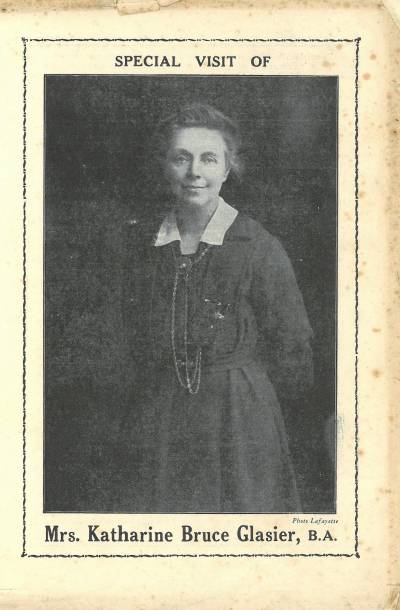When Katharine Bruce Glasier died in 1950 the Manchester Guardian in its obituary referred to her as one of the ‘remarkable group of women pioneers of the British labour movement.’ Whilst the role of all of these women has been downplayed, the importance of the work of Katharine in particular is often overshadowed by her marriage to an important figure in the ILP and early socialism - Bruce Glasier.
Katharine St. John Conway was born into a religious family in London in 1867 and by virtue of a school scholarship went on to be one of the earliest women students at Cambridge University. Although women were not allowed to graduate, Katharine went on to add ‘B.A.’ after her name. She taught Classics in Bristol and was attracted to Socialism as an expression of practical Christianity.

Flyer advertising an ILP meeting in Leicester, ?1929
She joined the Bristol Socialist Society and was briefly a supporter of the Social Democratic Federation and the Fabian Society. Her true political and Christian expression was found in the Independent Labour Party in 1893 but she also lectured extensively for the Fabian Society and the Labour Church. A constant element in her life was that of journalism and at this time she wrote articles for the Sunday Chronicle and the Workman’s Times.
She was on the committee which convened the inaugural conference of the ILP and was the only woman elected to the ILP National Administrative Council. It was at this time that she married her fellow Christian Socialist Bruce Glasier.
Both of them travelled and lectured extensively and wrote books and pamphlets. In addition, Katharine wrote novels and short stories which focussed on issues of class and gender. Despite having the major role in bringing up their children, Katharine still spoke at meetings around the country but turned to writing fiction and journalism as a way of earning a living.
Katharine’s financial worries were to some extent alleviated in 1909 when a rich American woman, Elizabeth Glendower Evans stayed with them in Chapel-en-le-Frith and set up a Trust Fund for her. Elizabeth commented that the Glasiers lived ‘like early Christians’ and devoted their whole lives to Socialism.
In 1916 Katharine became the editor of the Labour Leader, a publication that she had written for extensively. She stuck to the anti-war line which had been established by the previous editor Fenner Brockway, who was in prison as a conscientious objector. As an editor she refused to print the rather strong anti-Marxist writing of Philip Snowden at the time of the Russian Revolution. Bruce Glasier died in 1920 but she continued to edit the Labour Leader until in 1921 she was ‘relieved’ of the editorship and suffered something of a breakdown. By 1923 she returned to address meetings all over the country and wrote articles for Labour’s Northern Voice and other journals. Katharine joined the Society of Friends and suffered the loss of her son Glen when he was killed playing football at his Quaker school.
Much of her later emphasis was upon blending Socialism and spirituality, being heavily influenced by the works of Walt Whitman. She campaigned alongside Margaret McMillan and pressed for nursery education and the provision of school meals. She felt that Philip Snowden and Ramsay MacDonald had betrayed the Labour movement in supporting the National Government, but when the ILP disaffiliated from the Labour Party she did not follow.
An important piece of Katharine’s work was in support of Save the Children, an organisation which was set up in 1919 by Eglantyne Jebb and Dorothy Buxton to assist starving Austrian and German children who were starving as a consequence of the British food blockade put in place in Europe after the end of the First World War.
Katharine moved to Earby near Skipton and when she died her home became a Youth Hostel.
Katharine Bruce Glasier was a lifelong campaigner, an impressive speaker, novelist and writer of many articles. In the Manchester Guardian obituary in 1950 she was summed up as being ‘a Socialist evangelist and her speeches had the emotional force of a revivalist.’
The Working Class Movement Library has a range of material for people to come in and read on the life and political background of Katharine Bruce Glasier. This includes the biography of Katharine and Bruce, The enthusiasts by Lawrence Thompson [Shelfmark B05] and a portrait from Earby – Katharine Bruce Glasier 1867–1950 by Robert Abel [Socialism – Box 1].
The wide range of her interests is represented by:
The Glen book, which marked the death of her son [A42]
Tales from the Derbyshire hills [A42]
Eglantyne Jebb and the world’s children [Children – Box 1], and
National old age homes [Pensioners – Box 2].
Her writings on Socialism include:
Socialism for beginners,
Socialism and the home and
Socialism for children [all ILP – Box1].
The Library has the biography Margaret McMillan and her life’s work written by Katharine [ILP – Box 1] and works written with her husband including The religion of socialism: two aspects [J23].
The Library also has some archival material from both Bruce and Katharine Glasier.
